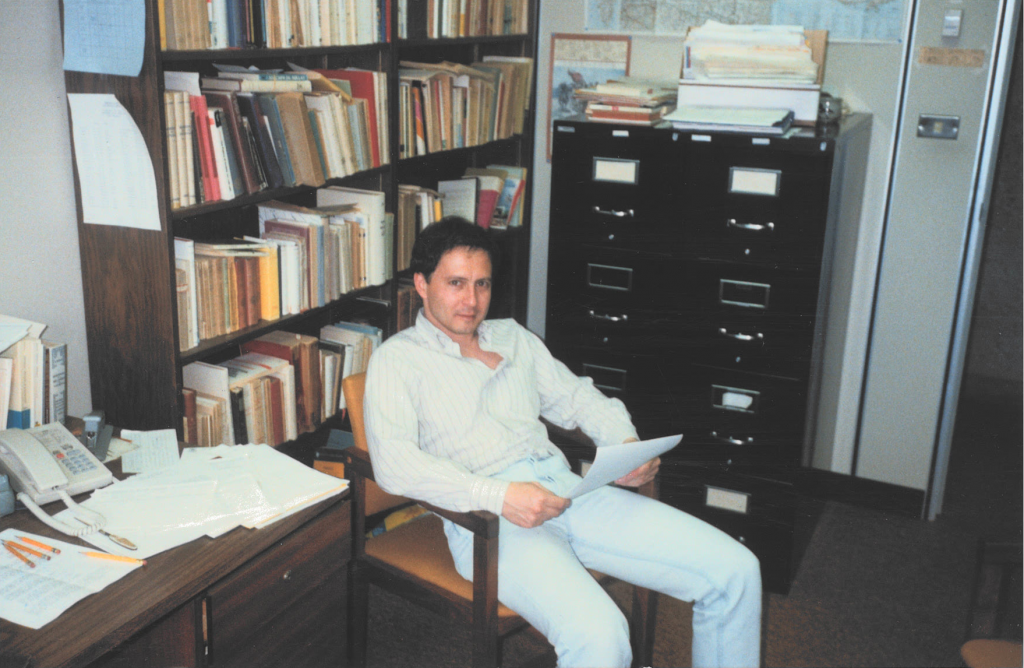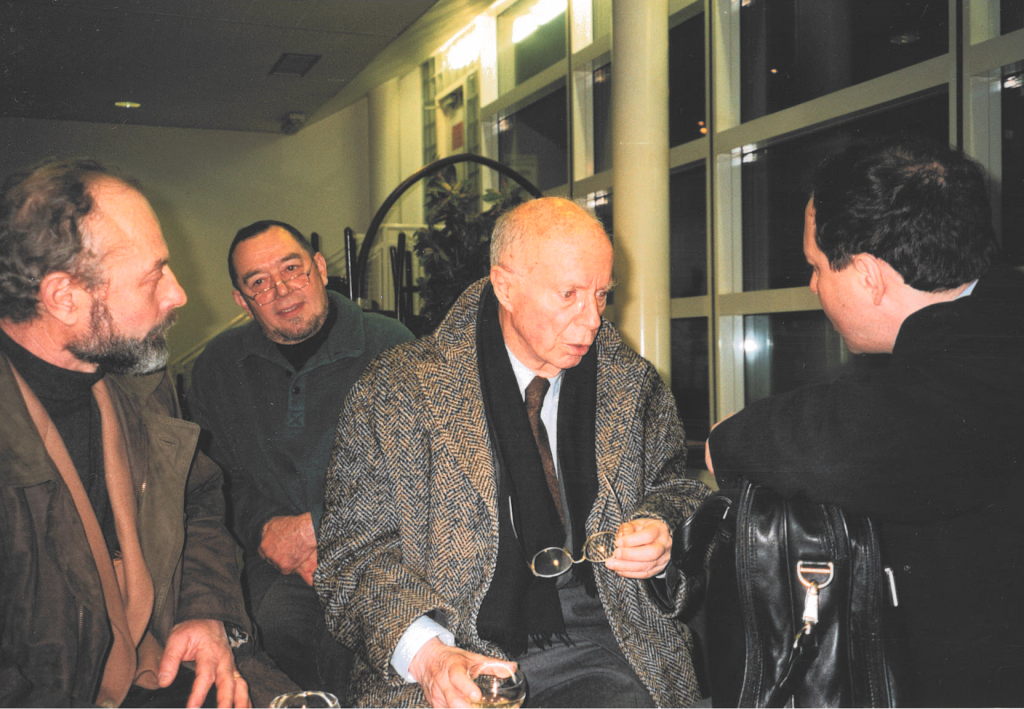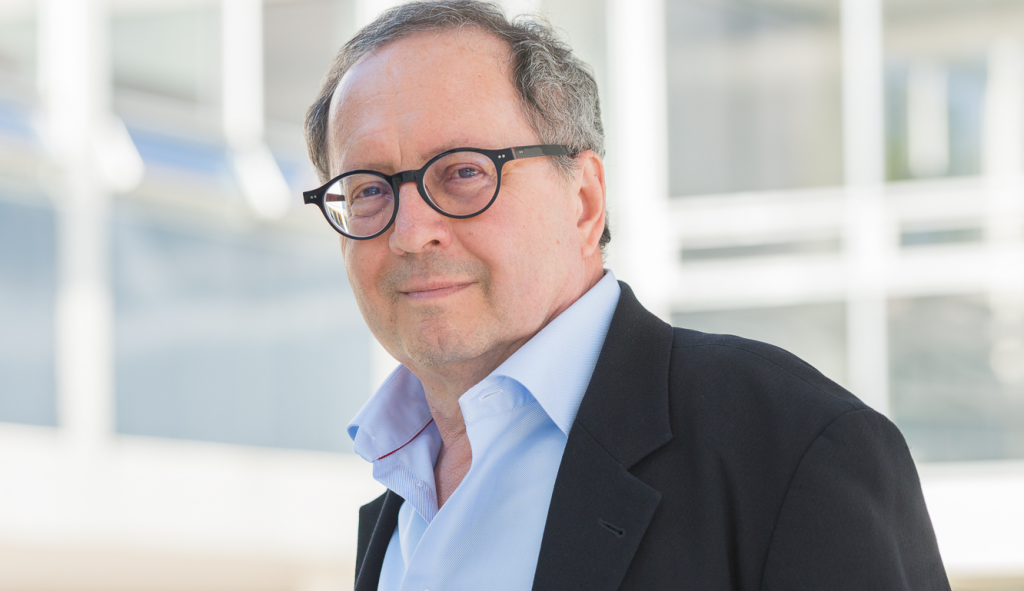Upon his retirement, Dr. Ralph Sarkonak reflects on 36 years of being a faculty member at the University of British Columbia. As a Professor of French Literature, graduate supervisor, Department Head, committee member, researcher and author, he has made a tremendous impact on the Department of French, Hispanic and Italian Studies, the Faculty of Arts, and the academic community at large.


Dr. Ralph Sarkonak during his first year at UBC circa 1983.
It’s surprising to see how quickly time flies; 36 years sounds like an awful long time! I won’t say it’s gone by in a flash — that would be too much of a cliché, it wouldn’t be accurate — but it has gone by quite quickly. As a child, I remember thinking that summers were too long. I wanted to go back to school already because August would just drag on and I’d think, “My gosh, time is so slow!” Now time goes by so quickly, it’s like being on a speeding train (a French one, I might add; they are a lot faster than North American ones).
Once, when I was in London, I went for breakfast at the hotel and sat beside a man from Ireland, who asked me what I did. When I told him that I taught French literature at the University of British Columbia in Vancouver, he said, “Oh, that sounds like a very nice life!” I look back and realize that yes, it has been a very good life. I hope my successor will have as good of a run at it as I did.
What were the highlights of your career?
Graduate Student Supervision:
One of the most satisfying parts of my career has been dealing with graduate students, whether that’s through teaching graduate seminars, being a member of an exam committee, or supervising students’ research. My task, as I see it, is to help students put their ideas into an acceptable academic form and express themselves clearly, mustering arguments based on evidence in the literary and theoretical texts they study. It’s a big commitment in terms of time and effort for the graduate student and for the faculty members as well — but I don’t regret any of that.
Maybe I’m a midwife – there’s a precedent — helping students give birth to an MA thesis or PhD dissertation. You get to see the students grow intellectually and mature as scholars, starting with a vague idea and emerging with what’s basically a book, in the case of doctoral students. You see them beginning to present their research at conferences and symposia, gaining confidence in themselves.
When they begin, they start off as students, but when they finish, they leave as colleagues. By guiding them through their thesis, I hope to teach them how they, too, can direct a thesis in the future.
Over the years, I have had many ‘thank you’ cards from students, but the best way they can thank me is to help a student of theirs, years later. I often feel that I’m paying a debt to the professors who taught me; the best way to do that is by working with the next generation … Well, I suppose that’s several “next generations” by now, since it’s been 36 years!
Undergraduate Teaching:
Publishing a book, rewarding as it might be, didn’t quite compare to the same high I got from receiving the Killam Teaching Prize in 2011. It was extremely … well, nice. It was one of the highlights of my career.
I have enjoyed teaching courses from across the entire French curriculum, including language courses. But for the most part, I have taught literature courses, sometimes with a historical focus, including one on French women and World War II. I enjoy lecturing, but I enjoy hearing students participate even more, engaging in groups to tackle different problematics.
My goal in teaching is to make myself redundant so that students will no longer need me to help with their reading, writing, etc.
Last term, I had students do lots of group work, and it was a pleasure to see them participate with such enthusiasm — on many occasions, the discussions were still going on after the class was over! I must have done something right, because I was no longer needed, which was exactly my goal.
For the World War II course, I invited René Goldman, a child survivor of the Holocaust, to give a guest lecture. It is always fascinating to see how the students react to being in the same room with someone who lived in France during the Nazi Occupation when the forces of the state were set on eliminating Jewish people, including children such as René.
I like to experiment with different types of writing assignments in senior undergraduate courses, such as writing a critical diary or a pastiche with commentary, and I have had some excellent results. I’m taking home copies of the best writing assignments that I have received over the years.
Department Head:
Serving as Acting Head on two occasions (2009-10 and 2015-17) was a very different experience. I never thought I’d be Head, and I never had any particular plans to do administration, but the most satisfactory part of this role was conducting successful searches for hiring new faculty and staff members.
Farid Laroussi, Anna Casas-Aguilar, Gaoheng Zhang, Stéphanie Palisse, and Michael Ferrazzi were all hired while I was Acting Head. Since stepping down from that job, I was a member of the hiring committees for Patrick Moran and Brianne Orr-Alvarez. While Acting Head, two colleagues, Raúl Alvarez-Moreno and Alessandra Santos, were promoted to the rank of Associate Professor. These are very, very important decisions to make in terms of what each colleague can contribute to our students and the academic community over the course of their career. You always want to get the decision right. A lot of work and time go into these decisions, but it is worth all the effort.
Committee Involvement:
One of the most interesting tasks I’ve had during my time at UBC was being part of the Dean’s Advisory Committee on Promotion and Tenure.
It was fascinating to see the breadth of research that is done in various departments within the Faculty of Arts.
As you can imagine, promotion files are very different when they come from departments as varied as Psychology, Music, Theater, Fine Arts, Anthropology, and History – to name a few. The committee would read every single page of these files with a critical eye to make sure they’d be in as good shape as possible by the time they went to the President’s committee. Dean Pat Marchak was a joy to work with; she would start off the discussion about each promotion file by saying, “Teach me about this file.”
After my third fellowship with the Social Sciences and Humanities Research Council (SSHRC), I was asked to be on one of the literature committees, in which I was a member for one year and Chair for two years. It was quite the experience going to Ottawa in the winter and working with colleagues from across the country.
I know some people get discouraged when they don’t get SSHRC grants and don’t seem to think the process is fair, but in fact it is very fair. We bent over backwards, taking the time to debate each file thoroughly. A foreign scholar on the committee one year was very impressed by the seriousness of the operation and wished they had an equivalent in the U.S. It was all done very professionally, and it was a very positive experience; the only problem was that wasn’t enough money to finance all the good applications!
Publishing:


Nobel Prize recipient and French author Claude Simon (second to the right) speaking with Dr. Ralph Sarkonak (right), December 1995
I wrote three books about Claude Simon and edited several collections of essays on his writing. The photo (above) shows me talking with him after a thesis defence in Paris in December 1995, which was 10 years after he got the Nobel Prize in Literature (with two Frenchmen watching us — somewhat with envy, don’t you think?).
I’d see him from time to time in Paris, and I met him at conferences in New York and Toronto. After seeing an exhibition in Paris about him in 2013 (he died in 2005), I went back to my hotel, picked up the phone, and had a nice conversation with his widow, Réa Simon, who later granted me permission to consult his manuscripts shortly before she, too, passed away. In 2017, I consulted one manuscript, and this October, I’m going back to Paris to look at another one.
I have written about some other writers, including Hervé Guibert. That project was perhaps the most difficult research that I’ve ever done.
He had AIDS at a time when HIV was basically a death sentence because there was no treatment, and he wrote about it extensively in his autofictions. I was reading a manuscript of Guibert’s works where he described his character as feeling a malaise one day, so he goes to the drugstore to get a prescription filled — and right there, in between those pages of the manuscript, was an actual prescription. Whether that was the exact prescription he was talking about, I don’t know, but writing about his writing about dealing with the illness was traumatic for me too.
I am fortunate that my research has allowed me to meet lots of people. Over the years I’ve heard many writers and theorists speak in person, including, Gérard Bessette, Marie Darrieussecq, Nancy Huston, Alain Robbe-Grillet, and Michel Tremblay, among the writers, as well as Jacques Derrida, Michel Foucault, Julia Kristeva, Jean Ricardou, and Michael Riffaterre, among the theorists. I also met Jérôme Lindon, Beckett’s French publisher, and his son the writer Mathieu Lindon, as well as other intimate friends and family of Hervé Guibert. As mentioned, I treasure my memories of Claude Simon and his interest in my research.
What changes would you like to see at UBC?
Over the years, the biggest change I’ve seen among undergraduate and graduate students has been a noticeable increase in stress — perfectionism, anxiety, and depression — and I attribute some of it to the way our semester system is designed.
When I first started here, most courses were a year long, so the rhythm was very different. Winter exams were more like midterms, and it made for a more relaxed atmosphere. Now our terms are 13 weeks long, so even missing one week is a big thing.
That’s why I propose that we start the second Winter Term one week later than we usually do. Right now, many students miss the first week of January classes because they live out of town and can’t afford to fly back to school during peak-fare season. Most undergraduates take five courses, some even six, so missing a week’s worth of courses can be an excruciating source of stress. I would also advocate adding a Midterm Break in the first Winter Term, around Halloween or Remembrance Day, which would allow students to complete their projects, or just relax. If this means starting before Labour Day, so be it.
That would be my wish for the university: to work seriously on improving mental wellbeing for everyone, and to start by adjusting the academic calendar. It isn’t beyond the realm of possibility. There are structural things that can be done. We have early alert systems and things that didn’t exist before. There is more talk about mental wellbeing for everyone, including faculty and staff. But I think UBC still has a long way to go. Right now, there’s discourse, but I want to see practical changes. We owe this to our students.
We’re never going to have a university that is stress-free — not much would be accomplished if there were no stress at all — but when it becomes an overwhelming burden, it is impossible to make any progress. I know, I’ve been there. As a graduate supervisor, my job is to make the process a little less stressful. I always tell students to make SMART goals that are Specific, Measurable, Attainable, Realistic, and Timely so that their goals are more feasible. It’s an important lesson, not just in research, but in life.


What are your plans after retirement?
I’m single, I don’t have close family in Vancouver, so in many ways, the Department was my family. I’ve been preparing for retirement, slowing down this last year … but I don’t want to stop.
Right now, I am on seven graduate student committees — I am the director for two students and a committee member for the other five. I hope to stay on them even after retirement; it will be quite a commitment. When you retire at UBC, I guess you don’t really retire!
I don’t have any specific plans after retirement. I may do some more writing. Of course, there will be lots of train travel, which I love. We’ll see how it goes. The freedom to travel in the fall, my favorite season, will be a new experience.
Do you have any parting words for the FHIS community?
The Department of French, Hispanic and Italian Studies is in a state of flux with a lot of people retiring over the next few years, but this is a strong Department with a great future, and I think that with the new hires we’ll keep on being just that. We have a great university and an even greater Faculty of Arts, and we have, for the most part, very good students. Let’s see what we can make of it.
UBC has grown in stature since I arrived. It’s always been a good university, and I think it’s even better than what the rankings show it to be. The Faculty of Arts is in an excellent position; the Dean has told me how well the Department is doing. I have hope that with the new President, and with the new Head, Joël Castonguay-Bélanger, things are going to keep on going well. I am sure they will. If people think that I have been able to contribute to this community even a tiny bit over the past 36 years, I will be very content.
———
Professor Ralph Sarkonak received his PhD from the University of Toronto in 1979 and taught for four years at Yale University before coming to UBC in 1983, where he remained until his retirement. Throughout the years, he was promoted to Associate Professor in 1987 and to Professor in 1992. He received the Killam Research Prize in 1999 and the Killam Teaching Prize in 2011, and has published works on Claude Simon, Roland Barthes, Hervé Guibert, and Renaud Camus. Learn more.


